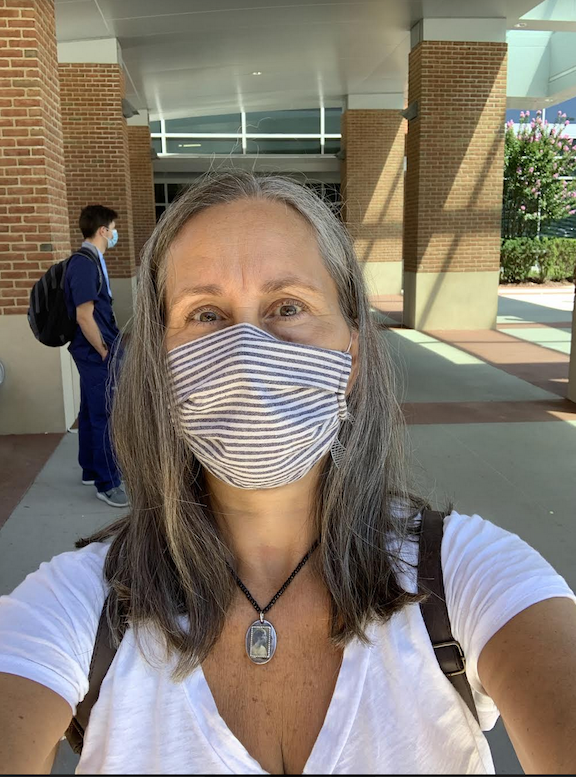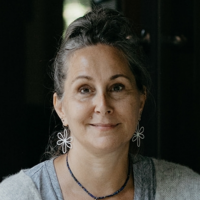Three months ago, I got a call from my OBGYN, “Unfortunately, these aren’t the results we hoped for.”
She went on to tell me that I had endometrial (uterine) cancer and that I would need to get an appointment immediately with an oncology surgeon. Although elective surgeries had been canceled due to COVID-19—this was not elective. I grabbed a notepad and jotted down the names and numbers of the four doctors she suggested.
A part of me was surprised to hear this diagnosis, since I had so few of the risk factors for this kind of cancer, but I wasn’t entirely unprepared. My mother and her sister were both diagnosed with endometrial cancer at around the same age. The other cause for my lack of surprise was an immediate and deep knowing that sh*t just happens, and even cancer is not about me.
As my teacher, Zen master Thich Nhat Hanh (a.k.a. Thay) says, “This is because that is.” Causes and conditions are what create the world of form. From the perspective of emptiness, there is no separate “me” for this to be happening to. It’s just happening. Cancer was growing in me the same way that the grass grows in between the cracks on the sidewalk.
My Mindfulness Parachute
I felt as if my mindfulness practice was a parachute that had not yet been tested at such an altitude. To my great joy, my mindfulness parachute opened in time to prevent an emotional crash. I was able to remain completely present in my body, even somewhat relaxed and at ease. I asked my doctor, “Is this something that is likely to kill me?” Getting through cancer treatment would require one kind of focus, facing my own death would require another.
As I moved through the next four months, I relied heavily on the following five practices: breathing, loving-kindness, impermanence, walking meditation, and deep relaxation. These are all practices, meaning that they are ways we choose to behave. While I am sharing many of the positive experiences I had using these practices—know that I have had many moments of fear and sadness as well.
These five practices are what gave me hope, confidence, and even joy:
1. Breathing
The doctor replied to my question, “No, it isn’t likely to kill you, but you will need to have a complete hysterectomy right away. That may include lymph node sampling and/or removal. Depending on what they find, you may need to have some adjunct treatment like radiation. Chemotherapy is unlikely, but we won’t know until the surgeon gets inside.”
Breathing in, I thought, I am okay here and now; breathing out, I have support, and I will get through this one breath at a time. Breathing in and breathing out. Right now I am here in my house and breathing. That’s enough.
Taking refuge in my breath as it shows up in my body is always step one. What a relief to be able to stay at home in my body when receiving this kind of news. Later, when things got more challenging, I asked the Buddha to breathe for me. But for this initial shocking moment, I was able to say hello to each breath as it arrived. This is thanks to the many hours I have spent following my breath on and off the meditation cushion.
2. Loving-Kindness
Within a week, I was lying on a “bed” in the surgical suite of the local hospital. While the nurses were prepping me, I practiced loving-kindness and gratitude toward each of them. I could see the extraordinary amount of time and effort each one had put in to their job.
Each one of these nurses and doctors studied and practiced for many years in order to take better care of my ailing body. Wow. This knowledge brought great joy and gratitude into my heart. I thanked them all in words, in my mind, and in my attention and smiles—I went into surgery with my heart full.
Unfortunately, when I woke up, I did not immediately feel loving-kindness. I woke up from surgery in agony, having full-body tremors and nausea from my reaction to the extended time under general anesthesia. My memory of that time is fuzzy, but there was a nurse who gave me one medication after another to help calm my nervous system and my belly. Looking back, I feel so much gratitude for her care. Once I stabilized I was taken to my room.
Looking at things through the lens of loving-kindness and gratitude hasn’t always been my typical pattern. I am a strong person (Enneagram 8) who can easily take people, places, and privilege for granted.
I have had to work hard at my loving-kindness practice.
Story has it, the practice of metta, or loving-kindness was offered by the Buddha to some of his monastics who were living in the wild forest and who were afraid. By sending loving-kindness to ourselves and others, we gain the insight of our interbeing with everyone and everything (my happiness depends on your happiness), and this helps transform our fear of the “other.”
3. Impermanence
I waited for a week after surgery for the pathology report, which would tell me the stage and grade of my cancer, whether it had spread to any of my lymph nodes, and what my next medical steps would be. During that week, I accepted the possibility that my cancer could have spread to other parts of my body, and—while unlikely—I could die.
One of the most profound practices I know to help us fully grasp the impermanent reality of our lives is to recall or recite the Five Remembrances (which can be found in the Plum Village Chanting Book). Reciting these over the years has instilled in me the knowing that death is inevitable and that all I can control are my actions:
I am of the nature to grow old;
There is no way to escape growing old.
I am of the nature to have ill health;
There is no way to escape ill health.
I am of the nature to die;
There is no way to escape death.
All that is dear to me and everyone I love are of the nature to change;
There is no way to escape being separated from them.
My actions are my only true belongings;
I cannot escape the consequences of my actions.
My actions are the ground upon which I stand.
It was clear that I had lived a good, full, and joyful life. While I in no way wanted to die, I also did not fear death. As Dumbledore told Harry in Harry Potter and the Sorcerer’s Stone, “Death is but the next great adventure.” And spiritual teacher Ram Dass says that death is like taking off an old shoe.
Later that week, I got the good news that my cancer had not spread past my uterus. It had succeeded in penetrating the lymphatic tissue within the uterus, though. So while the cancer was gone, I was strongly encouraged to get internal radiation to prevent a recurrence.
I struggled with this decision, because I didn’t want to hurt my body any further. I asked around and got the same answers from multiple doctors, so I decided to trust that what would be—would be. I could have chosen not to get the radiation, but I couldn’t control the outcome of the radiation treatment of the cancer.
I made the decision to do it, and let go.
4. Walking Meditation
I was lucky. I was already through menopause when I got this diagnosis. I had resources, supportive family, insurance, and access to amazing medical care. As a long time yogi and Pilates student, I was already physically healthy, and I was able to continue to walk every single day of my treatment.
I didn’t always pay attention to every step, or link every step with my breathing, but I enjoyed walking—with or without dogs and friends—knowing that walking on the Earth is a miracle.
I used a large Post-it note to pin one of Thich Nhat Hanh’s Gatha’s next to my bedroom window, so that each morning I would remember what a miracle it was to be alive and to walk on the Earth:
Walking on the Earth is a miracle!
Each mindful step reveals the wondrous Dharmakaya (the ultimate reality of the world).
As a practice, daily walking was both physically and mentally healing for me throughout this process.
5. Deep Relaxation
Unsurprisingly, I was exhausted after my surgery and after each of my radiation sessions. On many of the mindfulness retreats with the Plum Village community, I had enjoyed daily deep relaxation and naps. I decided to implement this same practice of resting each day at home. I have a flexible work schedule, so I was able to take my rest time midafternoon. (For those who work nine-to-five, a daily deep relaxation can just as well be taken in the morning or evening.)
During my resting time, which ranges from 10 minutes to one hour, I take myself away from other people and focus on my health. Usually this means I listen to a guided deep relaxation meditation on the Plum Village app (sometimes I use Liberate, Health Journeys, Sanctuary, or Insight Timer.) Other times it means I curl up with my little dogs and listen to my neighbor’s clarinet practice. Sometimes I read part of a book or take a saltwater bath.
Learning how to stop body and mind is the first step to healing. As Thich Nhat Hanh often reminds us: “When an animal in the jungle is wounded, it knows how to find a quiet place, lie down, and do nothing. The animal knows that is the only way to get healed—to lay down and just rest.”
I believe this practice of resting helped me heal more quickly. I decided to continue this practice, and now set aside time on my calendar for stopping and resting every single day. Some days I don’t make it, but it’s my intention to continue this self-care practice which adds greatly to the strength of my mindfulness parachute.
Build your parachute before you need it.
My mindfulness practice—which includes my sangha (meditation community), daily sitting meditation, walks, rests, spiritual friends and teachers, and every single breath I take—is what allowed me to move through these last four months without succumbing to fear or reactivity. I have mostly felt like “myself” throughout it.
Of course parts of me have been afraid, angry, and confused. But because of my practice, I know that my true self is so much more than those feelings.
I was overjoyed to know that my practice would not abandon me when I most needed it. I had learned through the years how to take good care of my fear, anger, and confusion so that it wouldn’t ever overwhelm me.
I wouldn’t wish cancer on anyone. But we might choose to look at our difficult moments as ways to test our practice parachute. Does it open? If not, where might we need to focus our attention? Do we need more breathing practice, loving-kindness, death awareness, mindful movements, or rest?
Whatever and however you choose to practice: May you have a strong and flexible parachute and be well; may you be safe, may you be at ease, and may you be free from suffering.
~









Read 19 comments and reply